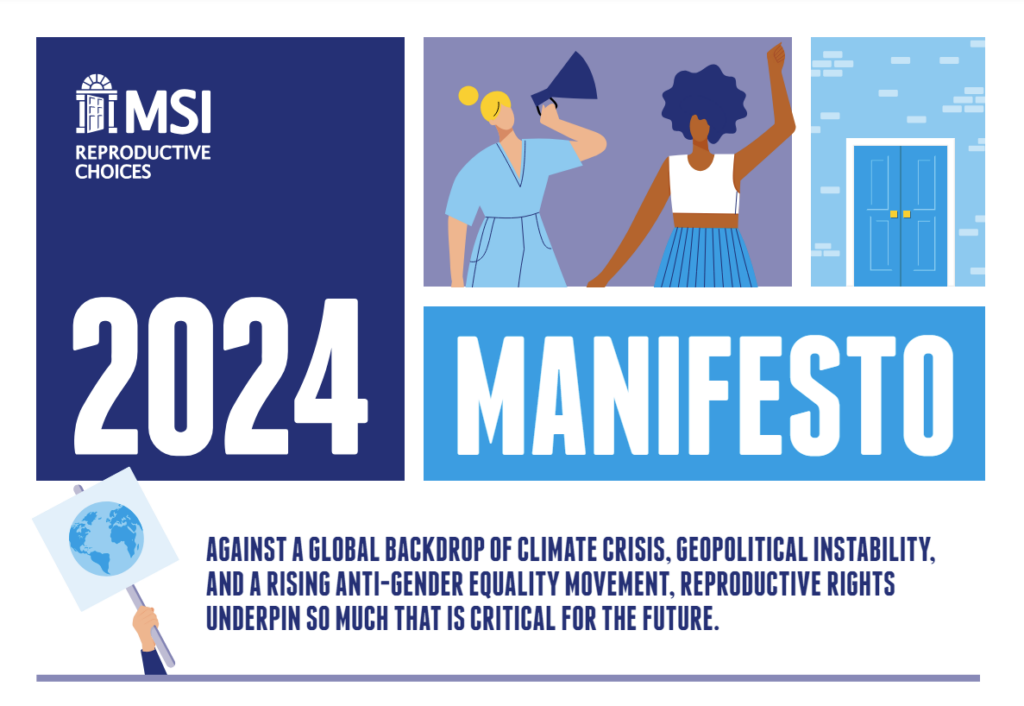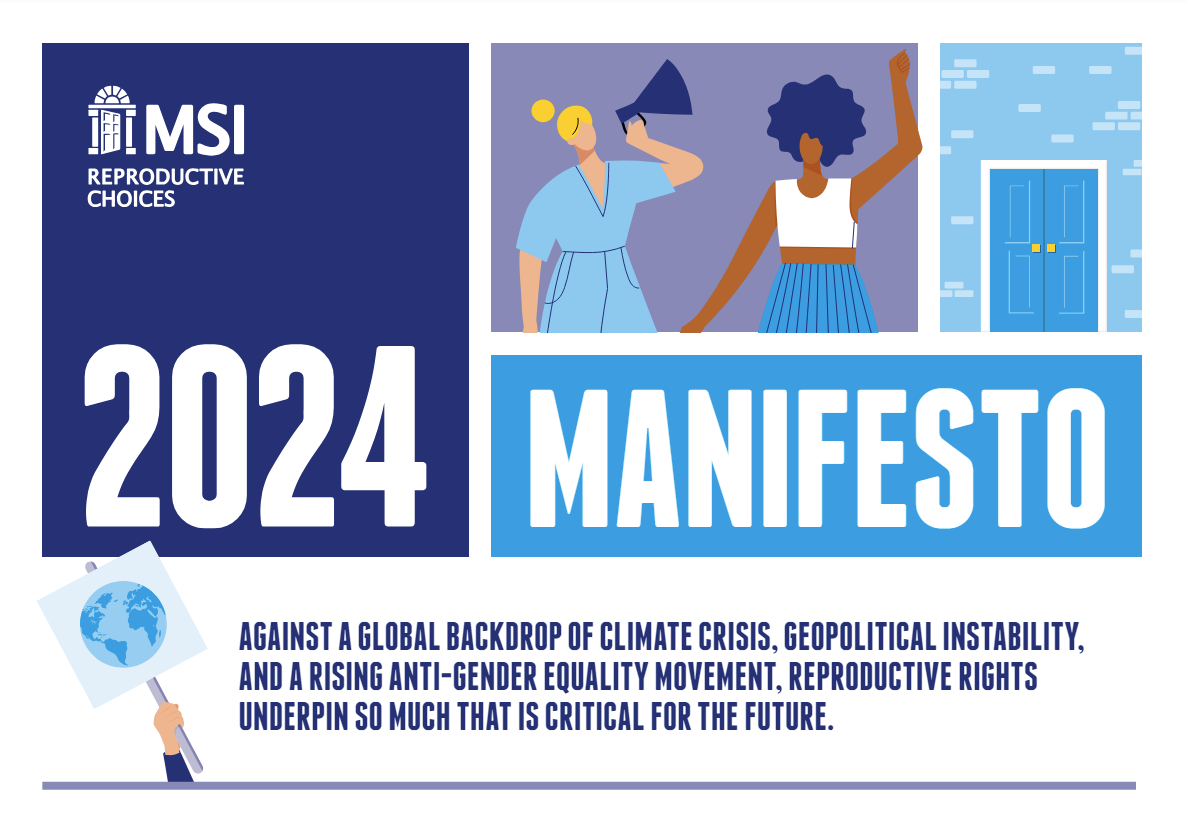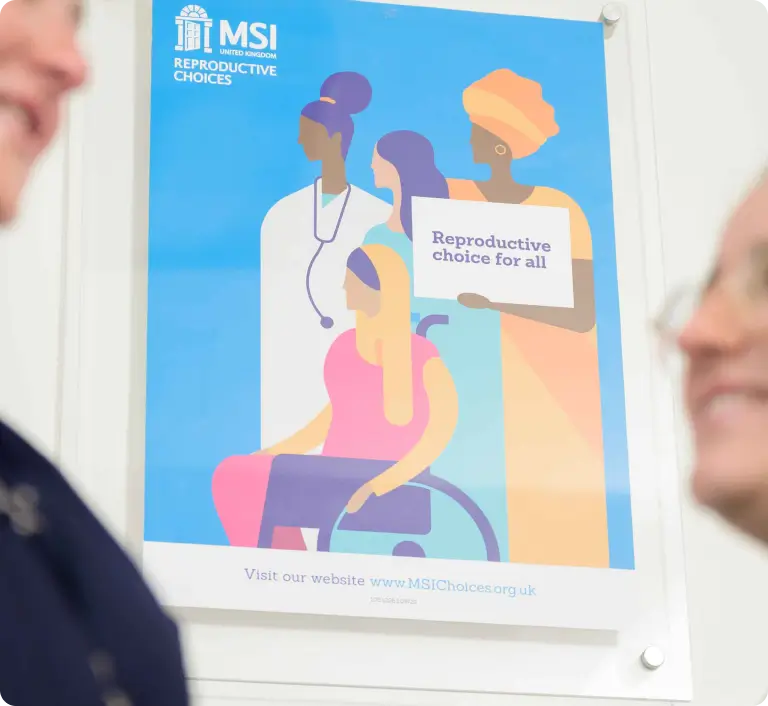There is a general election on 4 July 2024. As people across the country decide how to vote, we explore what good policymaking would look like in the areas of sexual and reproductive healthcare, abortion, and criminal justice, rising anti-choice extremism and gender equality.
Read our manifesto here: MSI Reproductive Choices 2024 Manifesto

Sexual and reproductive healthcare in England*
Women’s health and inequalities
Data repeatedly shows that healthcare is a top priority for voters, and that women are more likely than men to remain undecided about who to vote for much longer.
Yet women’s health continues to be overlooked by policymakers, especially when it comes to reproductive health. Last year, the outgoing government published its long-awaited Women’s Health Strategy for England. While much of the strategy was welcome, there was painfully little on reproductive health, and abortion was barely mentioned at all. There was an intention to publish a separate Sexual and Reproductive Health Plan, but this hasn’t happened yet.
That said, progress has been made in England which an incoming government could build upon. The non-partisan Women’s Health Ambassador Professor Dame Lesley Regan has led many crucial reforms which we have backed, such as delivering a Women’s Health Champion in every single Integrated Care Board (Integrated Care Boards are NHS organisations responsible for funding and planning health services in each local area.) Professor Regan also chairs the Royal College of Obstetricians and Gynaecologists Abortion Taskforce, of which MSI Reproductive Choices UK is a member.
Reproductive healthcare and inequalities
Reproductive choice is critical for gender equality. Without the ability to choose when or if they have children, women are more likely to experience unequal outcomes in education, to be unable to leave abusive partners, and to be raising children in poverty. The Joseph Rowntree Foundation says that larger families, caring responsibilities, and childcare responsibilities are all major indicators that make poverty more likely. It follows that there’s an economic benefit to investing in contraception and indeed the evidence bears this out. Public Health England reports that for every £1 invested in contraception, the Treasury saves £9.
Yet since 2015, sexual and reproductive health services have seen massive cuts and a lack of long-term planning, particularly around workforce. An economically prudent Chancellor and Health Secretary would recognise the critical state of sexual and reproductive healthcare services and the long-term benefits of serious investment.
Gender-balanced reproductive healthcare
‘Women’s health’ and ‘reproductive health’ are not interchangeable terms. Women’s health needs are broader than reproductive choice, and reproductive planning should not be the sole responsibility of women. With rising abortion demand and access to contraception challenges across the country, one sensible step for an incoming government would be to make vasectomy access consistent across the country, with fairer funding and a national commissioning standard. Depending on where you live, your local NHS may not commission vasectomy services in your area at all. If they do, they may not support self-referral, or there may be poor provision due to inadequate funding. Not only does this add to NHS pressures by driving up abortion care demand and by creating unnecessary bureaucracy, but it adds to gender-based healthcare inequalities. Women take on a disproportionate share on the work associated with reproductive healthcare planning. Many men would choose vasectomy if access was easier, and many women in relationships would prefer a vasectomy for their partner. Better vasectomy access would take pressure off essential services used mostly by women, such as Long-Acting Reversible Contraception (LARC) fittings and removals and abortion care, freeing up space for those who need it.
Choice at the centre
Of course, none of that would mean contraception access can be ignored. It is critical that everyone, regardless of their gender, is able to choose the right form of reproductive healthcare for their needs and preferences. For some, that will be a LARC. For others, that will be the morning-after pill. In some cases, abortion will be the right option.
As an unapologetically pro-choice healthcare provider, we want everyone to have accurate information, accessible services, and control over their own bodies. When it comes to questions about whether to have children, how many children to have, and how they want to manage their reproductive health, we trust women to make these decisions for themselves.
*Health is devolved, so the UK government only has responsibility for health in England.
To read our full policy recommendations on rising extremism, read our manifesto here.
Read more about our post-election policy vision
Visit the pages below to read more about our 2024 manifesto and the main policy changes we will advocate for during the next Parliament.

2024 Manifesto
Read and download our 2024 Manifesto: our post-election policy vision.

Abortion and Criminal Justice
Read our blog on policy reforms for abortion law and criminal justice.

Rising extremism
Read our blog on rising extremism and the weaponization of women’s choices.










































